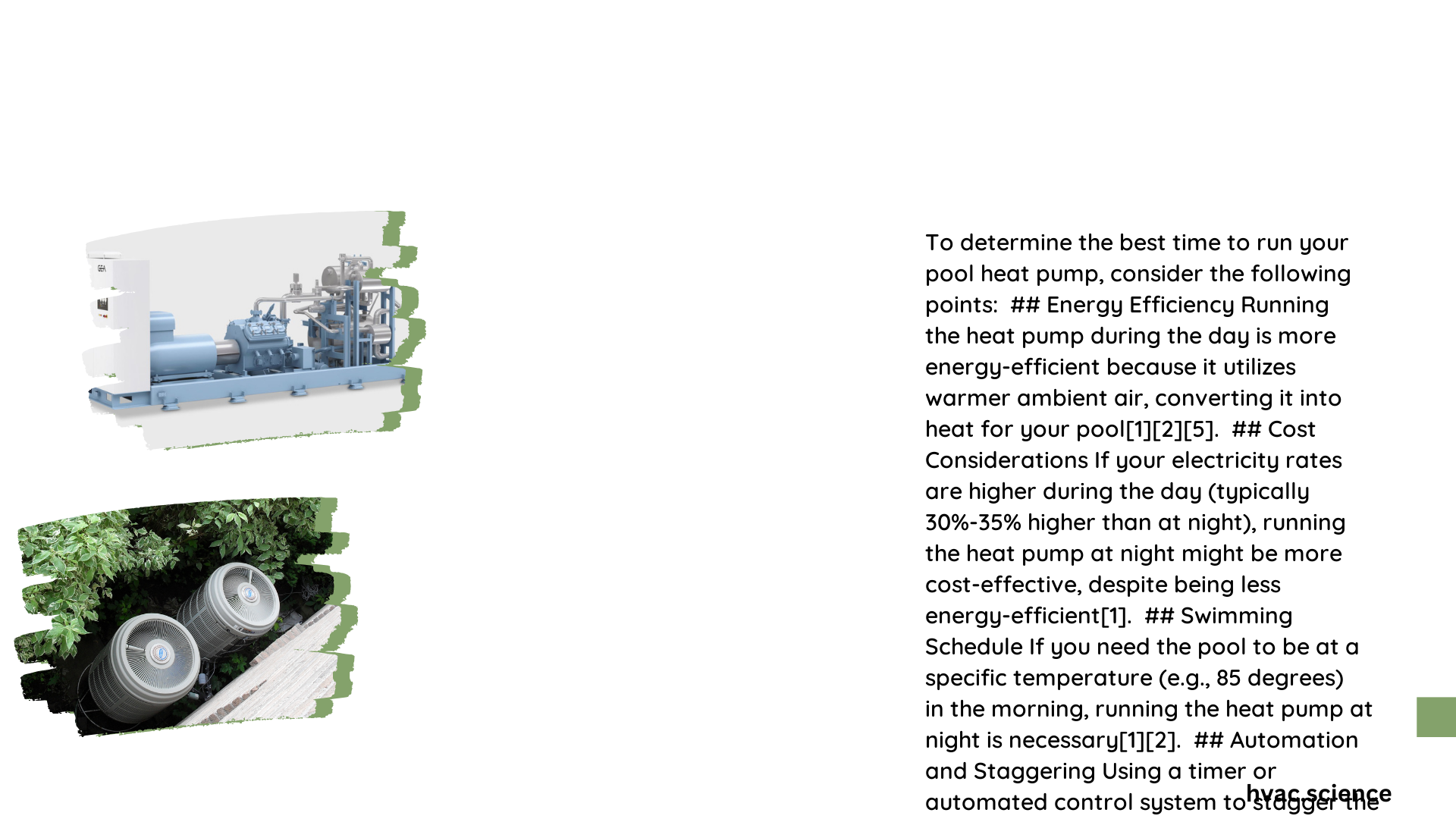Running a pool heat pump at night involves complex considerations of temperature, efficiency, and electricity rates. Pool owners face a critical decision that impacts both energy consumption and heating costs. The efficiency of heat pumps dramatically changes with ambient temperature, making nighttime operation potentially less effective but potentially more economical depending on local electricity pricing structures.
What Happens to Pool Heat Pump Efficiency at Night?
Pool heat pumps experience significant performance variations between day and night operations. The primary factor influencing efficiency is ambient air temperature, which directly impacts the heat pump’s Coefficient of Performance (COP).
How Does Temperature Affect Heat Pump Performance?
| Temperature Range | COP Performance | Energy Efficiency |
|---|---|---|
| 80°F Daytime | 5.6 COP | Highest Efficiency |
| 50°F Nighttime | 4.0 COP | Reduced Efficiency |
Key Performance Metrics
- Daytime Efficiency: Heat pumps generate approximately 5.6 units of heat per electricity unit
- Nighttime Efficiency: Heat pumps generate around 4.0 units of heat per electricity unit
What Are the Cost Implications of Nighttime Operation?
Nighttime pool heat pump operation involves several financial considerations:
- Electricity Consumption
- Average energy usage: 5-6 kWh per hour
-
Estimated nightly cost: $6.33 (based on $0.115 per kWh)
-
Potential Savings Strategies
- Use pool covers to minimize heat loss
- Leverage off-peak electricity rates
- Run heat pump during warmer nighttime periods
Can You Optimize Nighttime Pool Heating?
Optimization strategies include:
- Temperature Management
- Monitor ambient temperature
- Prefer running during warmer night segments
-
Use insulative pool covers
-
Electricity Rate Considerations
- Check local utility off-peak rates
- Calculate cost-effectiveness of nighttime operation
- Compare daytime vs. nighttime electricity pricing
What Factors Determine Nighttime Heat Pump Efficiency?
Critical factors include:
– Ambient air temperature
– Relative humidity
– Pool size
– Local climate conditions
– Electricity rate structures
How Do Electricity Rates Impact Nighttime Operation?
| Rate Structure | Nighttime Recommendation |
|---|---|
| Flat Rate | Limited benefit |
| Time-of-Use Rates | Potential cost savings |
| Variable Pricing | Strategic operation recommended |
Expert Recommendations

While nighttime pool heat pump operation can be beneficial, it’s not universally recommended. Carefully evaluate:
– Local temperature variations
– Electricity pricing
– Specific heat pump model capabilities
Final Considerations
- Prioritize daytime heating when possible
- Use pool covers to retain heat
- Monitor energy consumption
- Consult local energy professionals
Technical Insights
Modern pool heat pumps are designed with advanced technology that mitigates some nighttime efficiency challenges. However, significant performance drops occur below 50°F ambient temperatures.
Recommended Actions
- Assess local climate conditions
- Review your specific heat pump’s specifications
- Calculate potential cost savings
- Consider supplementary heating methods
Conclusion
Nighttime pool heat pump operation requires a nuanced approach. While potential cost savings exist, efficiency dramatically decreases with temperature drop. Strategic implementation, coupled with proper insulation and timing, can optimize your pool heating strategy.
Pro Tip
Always consult your heat pump manufacturer’s specific guidelines for optimal performance and efficiency.
